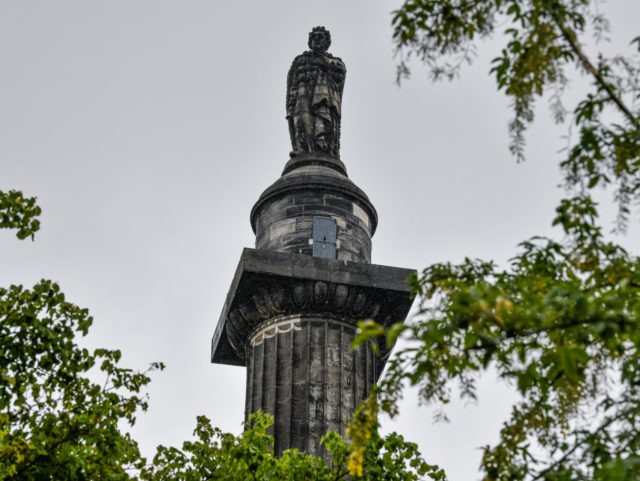Edinburgh’s municipal government has been condemned for a slapping a Black Lives Matter-inspired plaque on one of the Scottish capital’s most iconic monuments, accusing the statesman it commemorates of personal responsibility for “more than half a million enslaved Africans cross[ing] the Atlantic.”
Henry Dundas, 1st Viscount Melville, is little-remembered in the present day — except by left-wing activists — but was a “dominant figure” during the French Revolutionary and Napoleonic Wars as the de facto leader of a large faction of Scottish MPs in Parliament and a holder of various government offices, including that of Home Secretary and Secretary of State for War.
The Melville Monument, originally funded by “the voluntary contributions of the officers, petty officers, seamen, and marines” of the Royal Navy, now stands in his memory in Edinburgh’s St Andrew’s Square — but has been transformed from monument to millstone by a new plaque branding him “a contentious figure” and accusing him of being “instrumental in deferring the abolition of the Atlantic slave trade.”
This badge of shame, which notably does not mention that Dundas was the lawyer for runaway slave Joseph Knight in a case which saw slavery abolished on Scottish territory years before the end of the Atlantic slave trade, had been disputed by Dundas’s descendants, and it has now come under further criticism from Professor Angela McCarthy, a specialist in Scottish and Irish history at New Zealand’s Otago University, who has accused officials of essentially “falsifying history”.
Edinburgh Castle Changing War Heroes’ Memorial After One Person Complained of ‘Imperialism’ https://t.co/GJHx5nBokx
— Breitbart London (@BreitbartLondon) November 20, 2020
Writing in the peer-reviews academic journal Scottish Affairs, Professor McCarthy argued that it was “patently absurd, erroneous, and bad history” to claim that without Dundas — who did not own slaves and supported slavery’s “gradual” abolition — the trade would have been abolished sooner.
In reality, she wrote, the delay was informed by a variety of factors, not least “the critical dependence of the UK Treasury for war revenues from the lucrative Caribbean trades” at a time of global war with France and its allies, according to extracts of her paper quoted by The Times.
“Edinburgh city council have the urgent moral duty to remove [the plaque]. Otherwise, the city faces the grave charge and international opprobrium of falsifying history on a public monument,” warned the academic, not mincing her words.
Scotland: Robert the Bruce Statue Vandalised with 'BLM', 'Racist King' Slogans https://t.co/kDpamIzuRZ
— Breitbart London (@BreitbartLondon) June 14, 2020
Sir Thomas ‘Tom’ Devine, described by The Times as “Scotland’s foremost historian” and by The Financial Times as “Scotland’s most distinguished historian since Thomas Carlyle”, praised Professor McCarthy’s paper as a “tour de force of forensic historical research which irrefutably demonstrates that the text on the notorious plaque is brazen fake history”.
Edinburgh Council leader Adam McVey, of the left-separatist Scottish National Party (SNP), defended the woke addition to the monument, however, with The Times paraphrasing him as having said that the plaque was “factually accurate and… agreed after input from a panel of representatives and academic checks.”
He seemingly neglected to mention, however, that a previous committee described by Sir Tom as “evenly balanced group with opponents and supporters of Dundas involved” was abandoned with the onset of BLM mania in 2020, replaced by a “kangaroo court” led by anti-Dundas activist Sir Geoffrey ‘Geoff’ Palmer.
Sir Geoff, Scotland’s first black professor — but a specialist in the science of brewing, not history — has accused Sir Tom and Professor Jonathan Hearn, who has also criticised the plaque, of being part of “an academic racist gang”.
BLM-Inspired Review Targets Statues of Queen Victoria, Rabbie Burns, Nelson, and More in Scottish Capital https://t.co/hMw1oSXyjx
— Breitbart London (@BreitbartLondon) March 2, 2021

COMMENTS
Please let us know if you're having issues with commenting.